人教版英语初中九年级上册知识讲解,巩固练习(教学资料,补习资料): Unit 3 Could you please tell me where the restrooms are?第2课时Sectio
文档属性
| 名称 | 人教版英语初中九年级上册知识讲解,巩固练习(教学资料,补习资料): Unit 3 Could you please tell me where the restrooms are?第2课时Sectio | 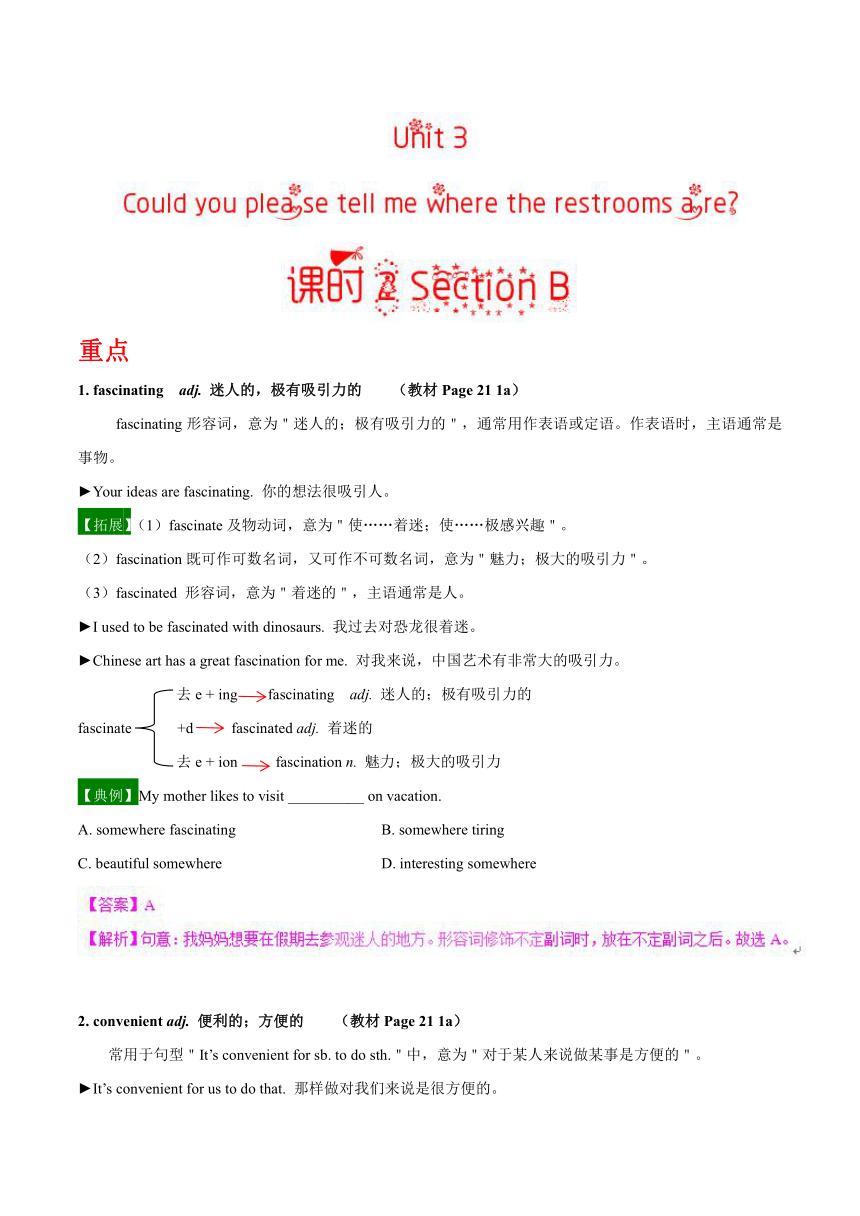 | |
| 格式 | zip | ||
| 文件大小 | 127.0KB | ||
| 资源类型 | 教案 | ||
| 版本资源 | 人教新目标(Go for it)版 | ||
| 科目 | 英语 | ||
| 更新时间 | 2019-09-14 16:45:06 | ||
图片预览

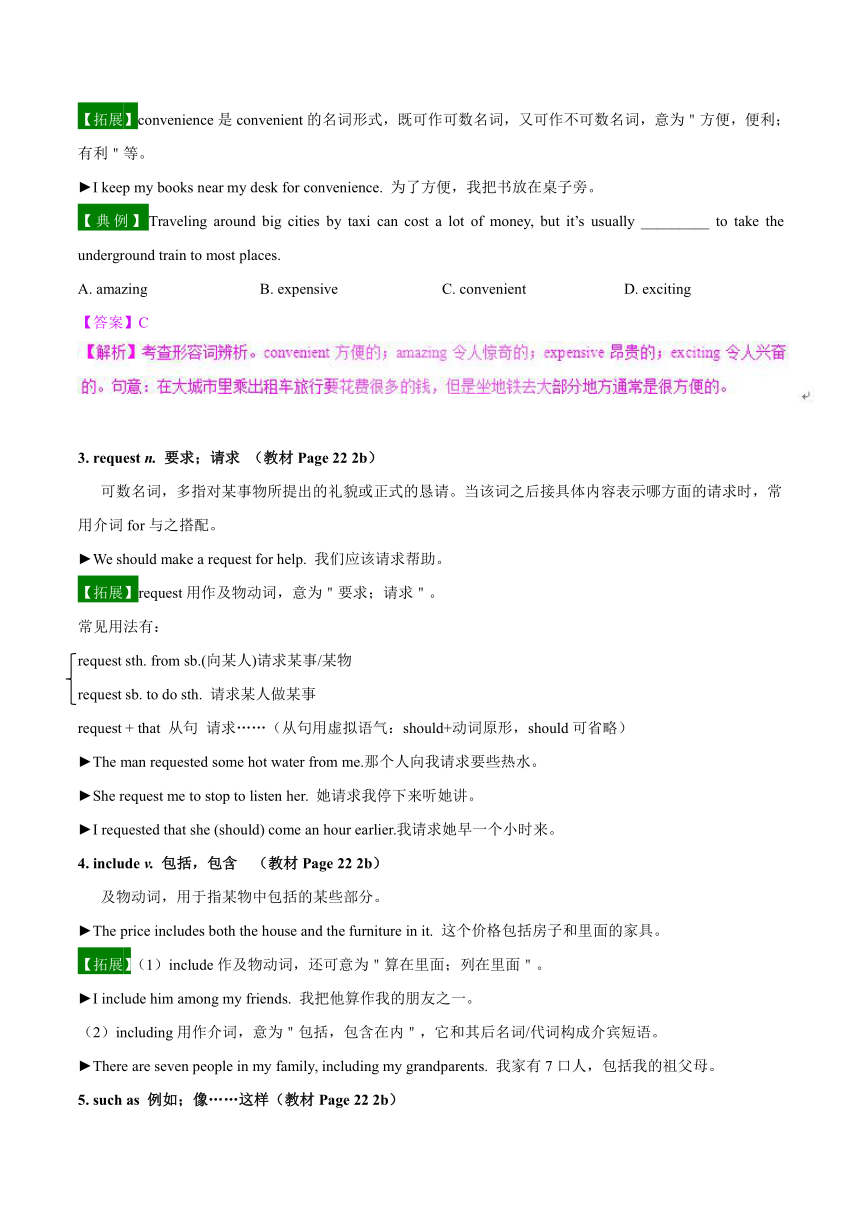
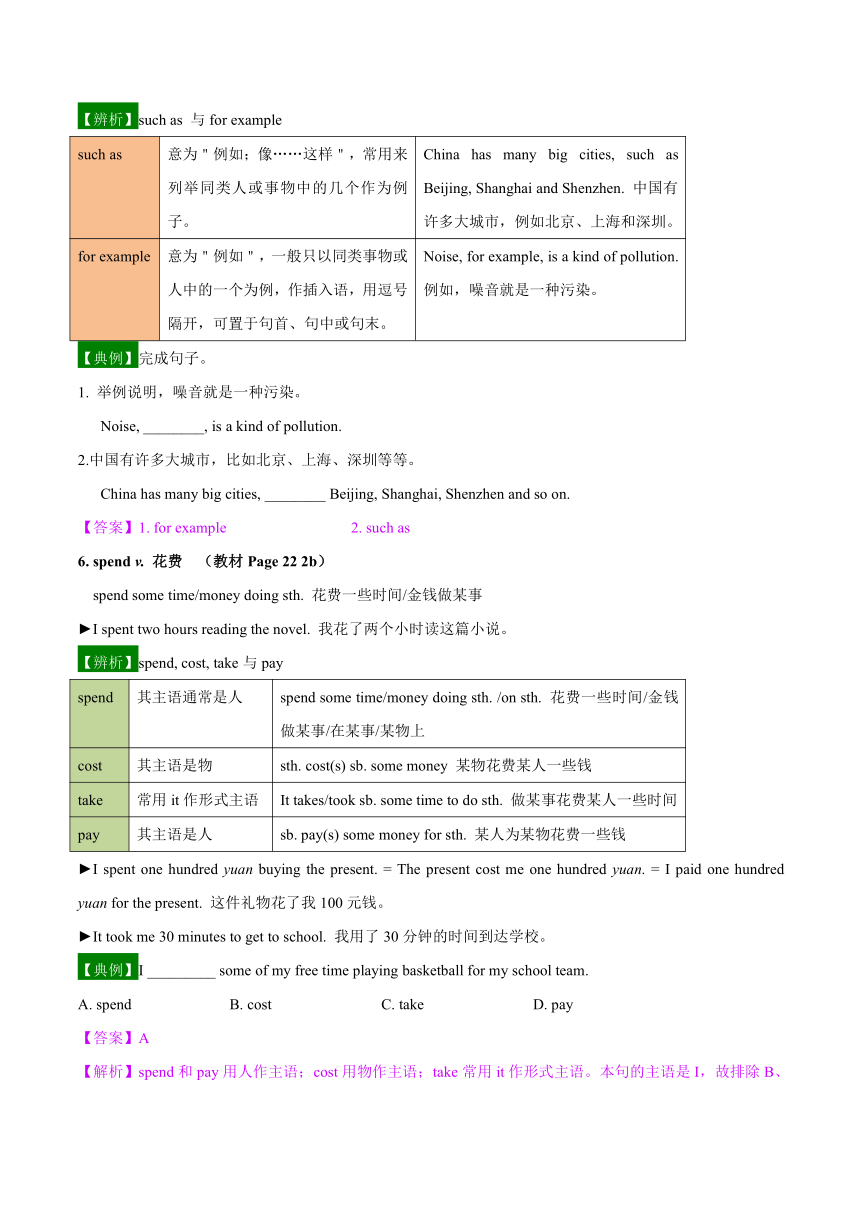
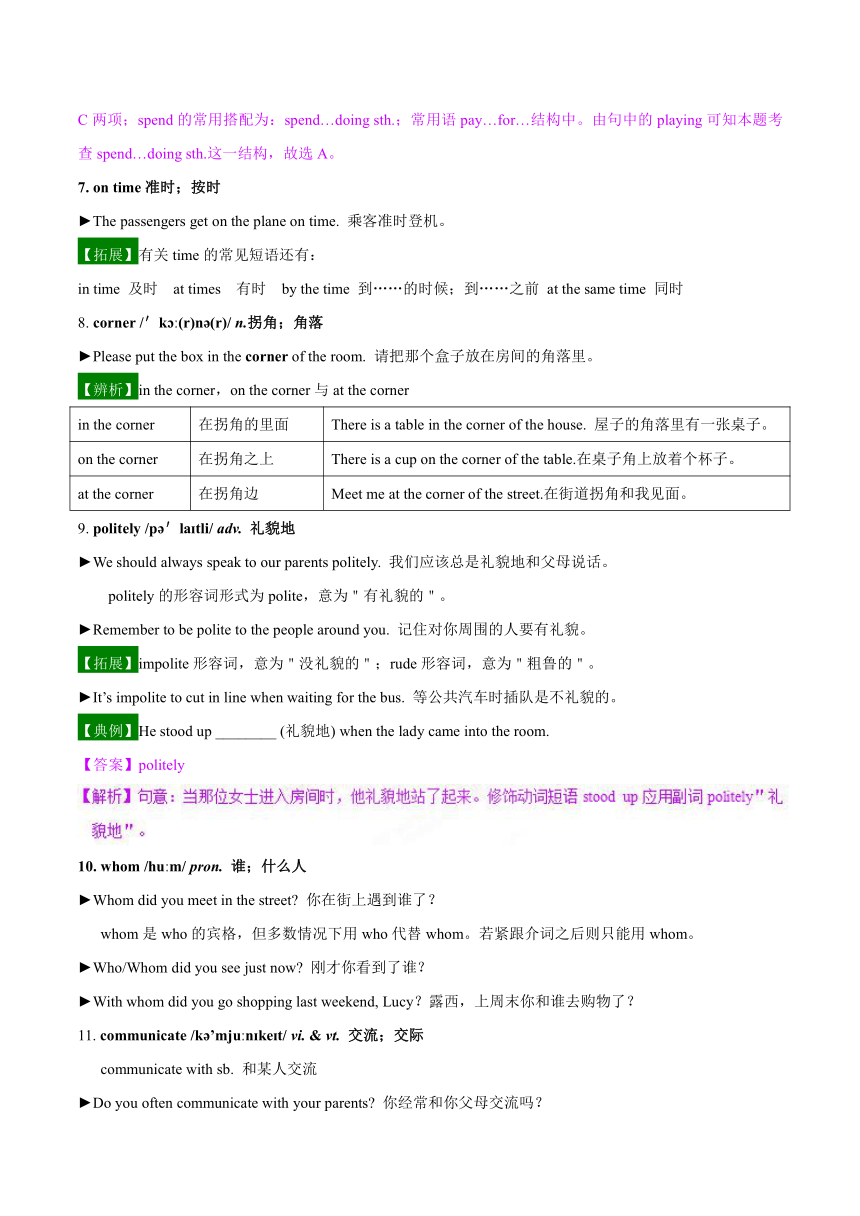
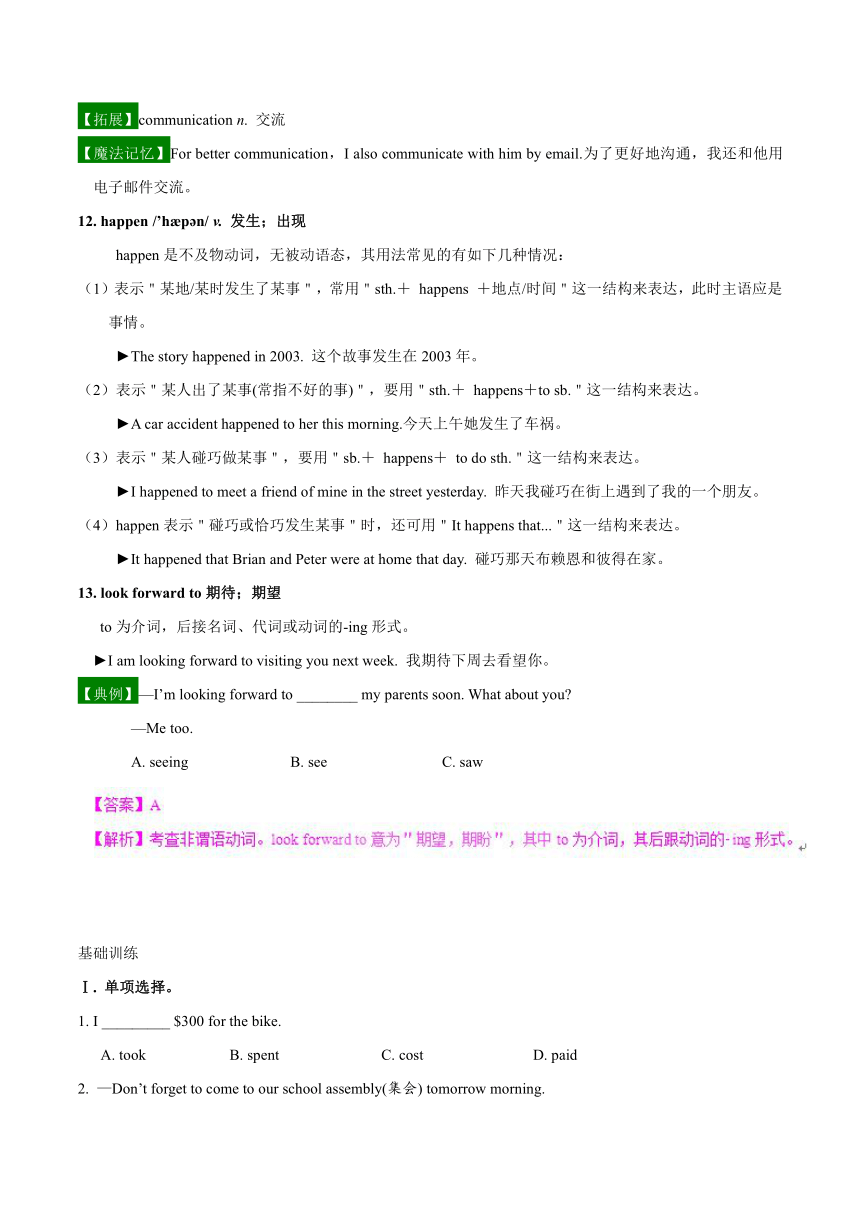
文档简介
重点
1. fascinating adj. 迷人的,极有吸引力的 (教材Page 21 1a)
fascinating形容词,意为"迷人的;极有吸引力的",通常用作表语或定语。作表语时,主语通常是事物。
?Your ideas are fascinating. 你的想法很吸引人。
【拓展】(1)fascinate及物动词,意为"使……着迷;使……极感兴趣"。
(2)fascination既可作可数名词,又可作不可数名词,意为"魅力;极大的吸引力"。
(3)fascinated 形容词,意为"着迷的",主语通常是人。
?I used to be fascinated with dinosaurs. 我过去对恐龙很着迷。
?Chinese art has a great fascination for me. 对我来说,中国艺术有非常大的吸引力。
去e + ing fascinating adj. 迷人的;极有吸引力的
fascinate +d fascinated adj. 着迷的
去e + ion fascination n. 魅力;极大的吸引力
【典例】My mother likes to visit __________ on vacation.
A. somewhere fascinating B. somewhere tiring
C. beautiful somewhere D. interesting somewhere
2. convenient adj. 便利的;方便的 (教材Page 21 1a)
常用于句型"It’s convenient for sb. to do sth."中,意为"对于某人来说做某事是方便的"。
?It’s convenient for us to do that. 那样做对我们来说是很方便的。
【拓展】convenience是convenient的名词形式,既可作可数名词,又可作不可数名词,意为"方便,便利;有利"等。
?I keep my books near my desk for convenience. 为了方便,我把书放在桌子旁。
【典例】Traveling around big cities by taxi can cost a lot of money, but it’s usually _________ to take the underground train to most places.
A. amazing B. expensive C. convenient D. exciting
【答案】C
3. request n. 要求;请求 (教材Page 22 2b)
可数名词,多指对某事物所提出的礼貌或正式的恳请。当该词之后接具体内容表示哪方面的请求时,常用介词for与之搭配。
?We should make a request for help. 我们应该请求帮助。
【拓展】request用作及物动词,意为"要求;请求"。
常见用法有:
request sth. from sb.(向某人)请求某事/某物
request sb. to do sth. 请求某人做某事
request + that 从句 请求……(从句用虚拟语气:should+动词原形,should可省略)
?The man requested some hot water from me.那个人向我请求要些热水。
?She request me to stop to listen her. 她请求我停下来听她讲。
?I requested that she (should) come an hour earlier.我请求她早一个小时来。
4. include v. 包括,包含 (教材Page 22 2b)
及物动词,用于指某物中包括的某些部分。
?The price includes both the house and the furniture in it. 这个价格包括房子和里面的家具。
【拓展】(1)include作及物动词,还可意为"算在里面;列在里面"。
?I include him among my friends. 我把他算作我的朋友之一。
(2)including用作介词,意为"包括,包含在内",它和其后名词/代词构成介宾短语。
?There are seven people in my family, including my grandparents. 我家有7口人,包括我的祖父母。
5. such as 例如;像……这样(教材Page 22 2b)
【辨析】such as 与for example
such as
意为"例如;像……这样",常用来列举同类人或事物中的几个作为例子。
China has many big cities, such as Beijing, Shanghai and Shenzhen. 中国有许多大城市,例如北京、上海和深圳。
for example
意为"例如",一般只以同类事物或人中的一个为例,作插入语,用逗号隔开,可置于句首、句中或句末。
Noise, for example, is a kind of pollution.例如,噪音就是一种污染。
【典例】完成句子。
1. 举例说明,噪音就是一种污染。
Noise, ________, is a kind of pollution.
2.中国有许多大城市,比如北京、上海、深圳等等。
China has many big cities, ________ Beijing, Shanghai, Shenzhen and so on.
【答案】1. for example 2. such as
6. spend v. 花费 (教材Page 22 2b)
spend some time/money doing sth. 花费一些时间/金钱做某事
?I spent two hours reading the novel. 我花了两个小时读这篇小说。
【辨析】spend, cost, take与pay
spend
其主语通常是人
spend some time/money doing sth. /on sth. 花费一些时间/金钱做某事/在某事/某物上
cost
其主语是物
sth. cost(s) sb. some money 某物花费某人一些钱
take
常用it作形式主语
It takes/took sb. some time to do sth. 做某事花费某人一些时间
pay
其主语是人
sb. pay(s) some money for sth. 某人为某物花费一些钱
?I spent one hundred yuan buying the present. = The present cost me one hundred yuan. = I paid one hundred yuan for the present. 这件礼物花了我100元钱。
?It took me 30 minutes to get to school. 我用了30分钟的时间到达学校。
【典例】I _________ some of my free time playing basketball for my school team.
A. spend B. cost C. take D. pay
【答案】A
【解析】spend和pay用人作主语;cost用物作主语;take常用it作形式主语。本句的主语是I,故排除B、C两项;spend的常用搭配为:spend…doing sth.;常用语pay…for…结构中。由句中的playing可知本题考查spend…doing sth.这一结构,故选A。
7. on time准时;按时
?The passengers get on the plane on time. 乘客准时登机。
【拓展】有关time的常见短语还有:
in time 及时 at times 有时 by the time 到……的时候;到……之前 at the same time 同时
8. corner /'k??(r)n?(r)/ n.拐角;角落
?Please put the box in the corner of the room. 请把那个盒子放在房间的角落里。
【辨析】in the corner,on the corner与at the corner
in the corner
在拐角的里面
There is a table in the corner of the house. 屋子的角落里有一张桌子。
on the corner
在拐角之上
There is a cup on the corner of the table.在桌子角上放着个杯子。
at the corner
在拐角边
Meet me at the corner of the street.在街道拐角和我见面。
9. politely /p?'la?tli/ adv. 礼貌地
?We should always speak to our parents politely. 我们应该总是礼貌地和父母说话。
politely的形容词形式为polite,意为"有礼貌的"。
?Remember to be polite to the people around you. 记住对你周围的人要有礼貌。
【拓展】impolite形容词,意为"没礼貌的";rude形容词,意为"粗鲁的"。
?It’s impolite to cut in line when waiting for the bus. 等公共汽车时插队是不礼貌的。
【典例】He stood up ________ (礼貌地) when the lady came into the room.
【答案】politely
10. whom /hu?m/ pron. 谁;什么人
?Whom did you meet in the street? 你在街上遇到谁了?
whom是who的宾格,但多数情况下用who代替whom。若紧跟介词之后则只能用whom。
?Who/Whom did you see just now? 刚才你看到了谁?
?With whom did you go shopping last weekend, Lucy?露西,上周末你和谁去购物了?
11. communicate /k?’mju?n?ke?t/ vi. & vt. 交流;交际
communicate with sb. 和某人交流
?Do you often communicate with your parents? 你经常和你父母交流吗?
【拓展】communication n. 交流
【魔法记忆】For better communication,I also communicate with him by email.为了更好地沟通,我还和他用电子邮件交流。
12. happen /’h?p?n/ v. 发生;出现
happen是不及物动词,无被动语态,其用法常见的有如下几种情况:
(1)表示"某地/某时发生了某事",常用"sth.+ happens +地点/时间"这一结构来表达,此时主语应是事情。
?The story happened in 2003. 这个故事发生在2003年。
(2)表示"某人出了某事(常指不好的事)",要用"sth.+ happens+to sb."这一结构来表达。
?A car accident happened to her this morning.今天上午她发生了车祸。
(3)表示"某人碰巧做某事",要用"sb.+ happens+ to do sth."这一结构来表达。
?I happened to meet a friend of mine in the street yesterday. 昨天我碰巧在街上遇到了我的一个朋友。
(4)happen表示"碰巧或恰巧发生某事"时,还可用"It happens that..."这一结构来表达。
?It happened that Brian and Peter were at home that day. 碰巧那天布赖恩和彼得在家。
13. look forward to期待;期望
to为介词,后接名词、代词或动词的-ing形式。
?I am looking forward to visiting you next week. 我期待下周去看望你。
【典例】—I’m looking forward to ________ my parents soon. What about you?
—Me too.
A. seeing B. see C. saw
基础训练
Ⅰ. 单项选择。
1. I _________ $300 for the bike.
A. took B. spent C. cost D. paid
2. —Don’t forget to come to our school assembly(集会) tomorrow morning.
—I won’t. I was _________ just now.
A. reminded B. promised C. allowed D. required
3.(2018 ? 重庆第七十一中学九年级上第三次月考)Could you tell me how long you _________ on your homework every day?
A. cost B. spend C. take D. pay
4. I hear it’s a _________ experience to visit the caves and many people go there every day.
A. terrifying B. fascinating C. boring D. frustrating
5. Don’t open the door to strangers; it’s not _________.
A. safe B. polite
C. convincing D. embarrassing
Ⅱ. 根据对话内容,从方框内选择恰当的句子将对话补充完整。(选项中有两项是多余的)
A:Excuse me, sir. 1
B:Certainly. Go along this street. Turn left into Xingfu Street, and the museum is on your right.
A: 2
B:It’s about thirty minutes.
A:I see. 3
B:Yes, you can. A No.103 bus will take you there.
A: 4
B:Over there. Look! The bus is coming.
A:Thank you very much.
B: 5
A. I will go to the History Museum.
B. You’re welcome.
C. Can I take a bus?
D. How long will it take me to walk there?
E. That’s such a pity!
F. Where is the bus stop?
G. Could you tell me the way to the History Museum?
Ⅲ. 根据汉语提示完成句子。每空一词。
1. 你能告诉我去书店的路吗?
Could you tell me________ ________ ________the bookshop?
2. 我们期望早日得到答复。
We’re________ ________an early reply.
3. 在三楼有个书店。
There is a bookstore________ ________ ________ ________.
4. 我想知道我把那些信封放哪儿了。
I________ ________I put those envelopes.
5. 你知道今天书店什么时候关门吗?
Do you know when________ ________ ________today?
IV. 选词填空。
1. The city is ____________ (fascinating / fascinated). I want to go there again.
2. Taking the bus in Hangzhou is ____________ (convenience /convenient).
3. I think the answer is ________ (correct/correctly).
4. Mary is a Japanese ________ (speak/ speaker).
5. I like your ____________ (direct/direction) way of speaking.
V. 用方框中所给词的适当形式填空。
polite, happen,expensive,corner,direct,ask for,think of,depend on
1. What ________ to you last night?
2. The clothes in this store are ________.Anybody can afford them.
3. Which is the most ________ way to Beijing?
4. It’s ________ to stare at anyone or to talk loudly in public.
5. I found a wallet at the street ________.
6. They offer advice on topics ________ home safety.
7. Jack came to ________my advice on his study.
8. The man doesn’t want to________________ his parents any more.
9. What does Tom ________the movie?
10. How to________________ people is a very important skill in modern society.
VI. 根据句意及汉语提示完成单词。
1. It is __________(方便的) to take the subway in Beijing.
2. There is a dog at the street __________(拐角).
3. If you have problems, you should make __________ (要求) for help.
4. Can you tell me the __________ (课程) you study at your school?
5. It is __________ (有礼貌的) to stand up when your teacher comes into your classroom.
VII. 用所给单词的适当形式填空。
1. My little daughter likes all kinds of sports such as ________(play) basketball and soccer.
2. It’s __________ (polite) to stare at anyone or to talk loudly in public.
3. (N) Work hard, and you will find the way to answer the questions ________ (correct).
4. A famous ________ (speak) will come to our school and give us a speech.
5. I have visited many coastal cities ________(include)Xiamen,Shanghai and Dalian.
能力提升
I. 完形填空。
Have you ever been to Shanghai? It’s quite a large city, so it’s very useful to take a map with you when 1 there. And maps can be easily found in most hotels and stores.
If you go there, you will find it 2 to travel in the city. You can take buses, taxis, subways and so on. Taxis are the fastest 3 them,but you’d better not travel during rush hour (高峰时段).Rush hour goes from about 7:30am to 9:00am, and then again from about 4:45pm to 6:30pm. You can choose to take the subway during that time, 4 it is also crowed. So if the place you want to visit is 5 enough, try to get there on foot.
Remember that Shanghai has two big areas. It’s divided (分开) by the Huangpu River. The east of the 6 is the area called Pudong. It is the newer and more developed part of Shanghai. The area on the 7 , the larger part of the city, is commonly known as Puxi. It 8 the west part of the Huangpu River.
Shanghai’s roads change all the time, but don’t 9 . If you ask politely, people there will be 10 to show you the right way. They are often kind to others.
1. A. traveling B. sleeping C. studying D. working
2. A. boring B. dangerous C. convenient D. cheap
3. A. among B. between C. in D. on
4. A. bcause B. if C. so D. but
5. A. funny B. famous C. close D. clean
6. A. road B. river C. north D. east
7. A. west B. south C. north D. east
8. A. includes B. tells C. means D. looks
9. A. laugh B. worry C. stop D. remember
10. A. angry B. happy C. afraid D. surprised
II. 阅读理解
A
Some people have a very poor sense of direction. Unluckily, I am one of them. I have visited a place many times but I may still get lost there for the next time.
When I was a little girl, I never dared to ask strangers the way. And so I used to walk around in circles and hope that by chance I would get to the place I was going to.
Now, I am no longer too shy to ask people for directions, but I often receive helpless or even wrong information. So I try to avoid giving people wrong directions. If anyone ever asks me the way somewhere, I would say,"Sorry, I am a stranger here."
Once on my way to work I was stopped by a man. He asked me if I could tell him the way to the Friendship Building. I gave him my usual reply. But just as I walked on only a few steps, I realized that he had asked the way to my office building. However, I had no time to turn back and look for him. I was rushing to meet with someone at my office and I didn’t want to keep him waiting.
When I just got to my office, the secretary(秘书) showed in the man who had asked me for directions. Imagine how embarrassed I was and how surprised he was when we saw each other at the first sight.
1. The writer always refuses to give people directions because .
A. she is a stranger to the city
B. she doesn’t know the people
C. she has no time to help others
D. she’s afraid of giving the wrong direction
2. A man stopped the writer on the way to .
A. sell her something B. ask her the time
C. make friends with her D. ask for the direction
3. The Friendship Building is the place where the writer .?
A.lives B.studies C.works D.teaches
4. The word "embarrassed" in the last paragraph means " ".?
A. 尴尬 B. 困惑 C. 激动 D. 拮据
5. Which of the following is TRUE according to the passage?
A.The writer is too shy to give others directions.
B.The writer has a very poor sense of direction.
C.The writer never got lost when she was young.
D.The man was quite nervous when he saw the writer.
B
It was a cold night. The taxi driver didn’t take even one passenger all day. When he went by the train station, he saw a young man coming out with two bags in his hands. So he drove to him and asked,"Where are you going, sir?"
"To the MP Hotel," the young man answered. When the taxi driver heard this, he didn’t feel happy any more. The young man would give him only three dollars because the hotel was near the train station. But suddenly, he had an idea. He took the young man through many streets of the big city. After a long time,they arrived at the hotel."Here we are! You should pay me seventeen dollars, please," the taxi driver said to the young man."What? Seventeen dollars! Do you think I’m a fool? Only last week, I took a taxi from the train station to this hotel and I only gave the driver fifteen dollars. I know how much I have to pay for the trip."
6. What was the weather like that night?
A. It was warm. B. It was cold.
C. It was hot. D. It was rainy.
7. The MP Hotel was the train station.
A. far from B. in C. near D. behind
8. The taxi driver and the young man got to the hotel .
A. very soon B. after a long time C. at once D. after a short time
9. The young man thought he should pay dollars for the trip.?
A. 50 B. 30 C. 17 D. 15
10. From the passage, we know that .
A. the two taxi drivers were honest
B. the young man knew the way to the MP Hotel
C. the young man came to the MP Hotel last week
D. the taxi driver didn’t know the MP Hotel
真题练习
1.(2018? 湖北宜昌卷)—The government is plenty of money building the countryside.
—We are pleased with the government’s efforts.
A. costing B. paying C. taking D. spending
2.(2018? 山东青岛卷)We have worked so long. Shall we stop a rest?
A. have B. to having C. having D. to have
3. (2019 ? 山东东营中考)_________ running after success, we have a lot of other interesting things to do in our
lives.
A. By B. On C. Besides D. Except
4. (湖北省宣昌市2019年中考)—A research suggests that walking helps people live longer.
—I quite agree, but it on when and how they walk.
A. remains B. separates C. returns D. depends
5. (2018年安徽省中考)—I am afraid I might forget to buy the bread after work.
—Don’t worry. I will you then.
A. notice B. allow C. remind D. promise
6. (内蒙古包头市2019年中考)As we all know, a person learns many things by making mistakes and ________ them.
A. corrects B. correct C. to correct D. correcting
参考答案
基础训练
Ⅰ. 单项选择。
1. D【解析】考查动词辨析。pay的主语是人, 常用于短语pay (sb.) (some money) for sth. ; take表"花费"常用于句型: It takes sb. some time to do sth.;spend的主语是人, 常用于spend. . . doing/on sth.;cost的主语为物, 常用于短语: sth. cost (sb.) some money。根据句意"这辆自行车花了我300美元"可知选D。
2. A【解析】句意:——明天早上不要忘记来参加我们学校的集会。——我不会忘记的。刚才我被提醒了。A. 提醒;B. 答应;C. 允许;D.需要。此题考查被动语态。根据句意可知选A。
4. B【解析】terrifying可怕的;fascinating迷人的;boring乏味的;frustrating令人沮丧的。句意:我听说参观那些山洞是非常奇妙的经历。每天有许多人去那儿。
5. A【解析】safe意为"安全的";polite意为"有礼貌的";convincing意为"令人信服的";embarrassing意为"令人尴尬的"。句意:不要给陌生人开门,那不安全。
Ⅱ. 根据对话内容,从方框内选择恰当的句子将对话补充完整。(选项中有两项是多余的)
1—5 GDCFB
Ⅲ. 根据汉语提示完成句子。每空一词。
1. the way to 2. looking forward to 3. on the third floor
4. wonder where 5. the bookstore closes
IV. 选词填空。
1. fascinating 2. convenient 3. correct 4. speaker 5. direct
V. 用方框中所给词的适当形式填空。
1. happened 2. inexpensive 3. direct
4. impolite 5. corner 6. such as
7. ask for 8. depend on 9. think of 10. communicate with
VI. 根据句意及汉语提示完成单词。
1. convenient 2. corner 3. requests 4. courses 5. polite
VII. 用所给单词的适当形式填空。
1. playing 2. impolite 3. correctly 4. speaker 5. including
能力提升
I. 完形填空。
【文章大意】本文告诉我们到上海去在交通上要注意的问题。
1. A【解析】句意:当到那儿旅行时,随身带一张地图上很有用的。旅行是travel。故选A。
2. C【解析】根据You can take buses, taxis, subways and so on可知,到这个城市去旅行是很方便的。方便的是convenient。故选C。
3. A【解析】句意:在他们当中,出租车是最快的。在三者或三者以上之中用among。故选A。
4. D【解析】句意:你可以在那个时间段选择乘地铁,但是也很拥挤。但是用but。故选D。
9. B【解析】句意:上海的路总是在变,但是不要担心。担心是worry。故选B。
10. B【解析】句意:如果你有礼貌的问,那儿的人会很高兴的告诉你路。本题考查be happy to do sth(高兴的去做某事)。故选B。
II. 阅读理解
1—5 DDCAB 6—10 BCBDC
真题练习
1. D【解析】句意:——政府现在正在投巨资建设农村。——我们对政府的努力感到很满意。costing花费,主语应该是物;paying付钱,常用于短语pay…for…;taking花费,常用于句型It takes sb. +一段时间+to do sth.花费某一段时间去做某事;spend花费,常用于句型spend+钱或时间+in doing sth.。根据空后面…building the countryside可知,这里应选D。
2. D【解析】句意:我们已经工作了很长时间。我们停下来休息休息吗?stop doing sth停止做某事;stop to do sth.停下来去做某事。所以选D。
3. C【解析】考查介词辨析。句意:除了努力成功,我们生活还有许多其它有趣的事情要做。A. By被,由;以……方式;B. On在……上;关于;C. Besides除开;指包含在内的;D. Except除……之外,指例外的。人生中有趣的事情,包括成功。故选C。
4. D【解析】句意:——一项研究表明散步有助于人们长寿。——我很同意,但这取决于他们什么时候走,怎么走。考查动词短语辨析题。A. remains保持;B. separates区分;C. returns返回;D. depends依靠。it depends视情况而定;depend on依赖于/取决于;根据句意语境,可知选D。
5. C【解析】句意:不要担心,我会提醒你的。A. notice注意到;B. allow 允许;C. remind提醒;D. promise答应;许诺;根据Don’t worry可知是会提醒你;故选C。
点睛:介词by意为"通过……,凭……",后面常接动名词,形成"by+v.-ing"结构,表示通过做某事而得到某种结果;本题中by后面有两个宾语,一个是making mistakes,另外一个是correcting them,and连接两个并列宾语,故答案选D。
同课章节目录
- Unit 1 How can we become good learners.
- Section A
- Section B
- Unit 2 I think that mooncakes are delicious!
- Section A
- Section B
- Unit 3 Could you please tell me where the restroom
- Section A
- Section B
- Unit 4 I used to be afraid of the dark.
- Section A
- Section B
- Unit 5 What are the shirts made of?
- Section A
- Section B
- Review of Units 1-5
- Unit 6 When was it invented?
- Section A
- Section B
- Unit 7 Teenagers should be allowed to choose their
- Section A
- Section B
- Unit 8 It must belong to Carla.
- Section A
- Section B
- Unit 9 I like music that I can dance to.
- Section A
- Section B
- Unit 10 You're supposed to shake hands.
- Section A
- Section B
- Review of Units 6-10
- Unit 11 Sad movies make me cry.
- Section A
- Section B
- Unit 12 Life is full of the unexpected
- Section A
- Section B
- Unit 13 We're trying to save the earth!
- Section A
- Section B
- Unit 14 I remember meeting all of you in Grade 7.
- Section A
- Section B
- Review of Units 11-14
